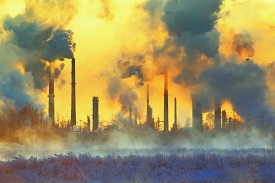 Since the mid-1980’s, virtually all Commercial General Liability (CGL) policies have contained some form of a total (or absolute) pollution exclusion. The 1988 ISO total pollution exclusion endorsement provides that there is no liability coverage for “property damage…which would not have occurred in whole or in part but for the…discharge, dispersal, seepage, migration, release or escape of ‘pollutants’ at any time.” “Pollutants” are generally defined as “any solid, liquid, gaseous or thermal irritant or contaminant including smoke, vapor, soot, fumes, acid, alkalis, chemicals and waste.”
Since the mid-1980’s, virtually all Commercial General Liability (CGL) policies have contained some form of a total (or absolute) pollution exclusion. The 1988 ISO total pollution exclusion endorsement provides that there is no liability coverage for “property damage…which would not have occurred in whole or in part but for the…discharge, dispersal, seepage, migration, release or escape of ‘pollutants’ at any time.” “Pollutants” are generally defined as “any solid, liquid, gaseous or thermal irritant or contaminant including smoke, vapor, soot, fumes, acid, alkalis, chemicals and waste.”
Not surprisingly, there has been significant litigation about the meaning of the term “pollutant” and whether the total pollution exclusion applies to all damage caused by a “pollutant” or only damage created by “traditional environmental pollution.” See, e.g. Meridian Mutual Insurance Co. v. Kellman, 197 F.3d 1178 (6th Cir. 1999) (discussing the split of authority in the courts). In Meridian Mutual Insurance Co., for example, the issue was whether there was liability coverage where a school teacher allegedly became sickened from fumes from a primer/sealer being used by a contractor to seal a classroom floor in her school. Applying Michigan law, the court determined that the total pollution exclusion did not extend to injuries caused by “pollutants” that were confined to the “general area of their intended use.” However, the court surveyed the opinions of other courts finding, more broadly, that all damages caused by “pollutants” were excluded from coverage under the total pollution exclusion.
Most recently, the total pollution exclusion was examined in the context of a diesel fuel spill within the confines of a high-rise office building in San Juan, Puerto Rico. Zurich American Insurance Co., et al. v. Lord Electric, et al., Doc. No. 3:09-cv-01111 (D.P.R. December 9, 2013). In that case, the building’s emergency power generation system, fed by diesel fuel, and a diesel fuel spill alarm system, were alleged to have malfunctioned, causing and permitting a spill of diesel fuel that was confined to the building. Tenants and their subrogating carriers filed suit against several building contractors to recover for their property damaged by the diesel fuel spill and extra expense incurred in moving to alternate locations during the resultant clean-up by the building owner. One defendant’s liability carrier disclaimed coverage for the plaintiffs’ claims, asserting the total pollution exclusion.
After surveying the split in the law, the federal district court in Zurich American Ins. Co. relied upon Puerto Rico law to decide that the total pollution exclusion did not apply to all damages resulting from a “pollutant” (the court assumed for the purposes of its analysis, without deciding the issue, that diesel fuel was a “pollutant” within the meaning of the exclusion). Instead, the court determined that the exclusion did not apply to a diesel fuel spill confined to the interior of the building and resulting from a malfunction of the operation of normal building systems. This, the court held, did not constitute “environmental pollution… as this concept is commonly understood,” Id. at page 14, even though the incident was deemed an “environmental emergency” by Puerto Rican authorities. Id.
In summary, in the context of subrogation actions seeking recovery for damages sustained by “pollutants,” one may be met with disclaimers of liability coverage under the total pollution exclusion. The applicability of the total pollution exclusion to those claimed damages will turn on a fact-specific analysis that begins with the pleadings, and the application of state law. The courts have split on these issues, and there is no “one size fits all” answer to the question about whether the claimed subrogation damages will, or will not, be covered by a defendant’s liability policy.





